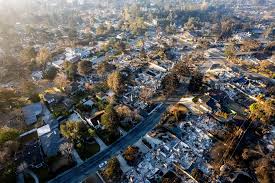Introduction
The Travelers Companies, Inc. has projected an estimated $1.7 billion pre-tax catastrophe loss due to the devastating California wildfires that occurred in January. This translates to approximately $1.3 billion after-tax losses, marking one of the most financially significant disasters the insurer has faced. The wildfires, which destroyed thousands of properties and displaced communities, have resulted in a surge of insurance claims.
Financial Impact and Industry-Wide Repercussions
The projected losses cover claims across Travelers’ personal and commercial insurance segments, including its participation in reinsurance agreements with Fidelis. Additionally, the company anticipates financial impacts from assessments imposed by the California FAIR Plan, the state’s last-resort insurance provider. The California Department of Insurance has been actively monitoring the situation, ensuring that affected homeowners receive prompt assistance.
Despite the staggering costs, analysts at MarketWatch predict that Travelers will remain profitable, though its earnings per share (EPS) forecast has been revised downward from $5.95 to $3.38 for the first quarter. Other major insurers, including Allstate and Chubb, have also reported wildfire-related losses, with Allstate estimating $1.1 billion in losses and Chubb projecting $1.5 billion in claims.
The Insurance Journal reports that the California FAIR Plan has already received over 4,400 claims related to the January wildfires, underscoring the significant financial pressure on insurers. This has led some companies to reconsider their coverage strategies in high-risk wildfire zones, potentially making it harder for homeowners to secure affordable insurance in the future.
Travelers’ Response and Relief Efforts
As part of its commitment to wildfire relief efforts, Travelers has pledged $1 million to support recovery initiatives in California. The funds are being distributed to organizations such as All Hands and Hearts, the California Community Foundation, International Medical Corps, and Team Rubicon, all of which are actively assisting affected communities.
Alan Schnitzer, CEO of Travelers, emphasized the company’s long-standing commitment to disaster response, stating that “in moments like these, actions speak louder than words.” The Travelers investor relations page highlights how the company is working with local and federal authorities to expedite claims processing and assist policyholders in rebuilding their homes.
Broader Economic and Environmental Consequences
Beyond the insurance industry, the January wildfires have had far-reaching economic consequences. Preliminary estimates suggest that total damages could exceed $45 billion, making this one of California’s costliest wildfire events. The destruction of infrastructure, residential properties, and businesses has placed a heavy burden on the state’s economy.
The California Governor’s Office of Emergency Services (Cal OES) has announced a $2.5 billion disaster relief package, aimed at helping communities recover. The funding will support hazardous waste removal, evacuation assistance, and rebuilding efforts for schools and local government facilities.
According to AP News, the federal government is also stepping in, with the Federal Emergency Management Agency (FEMA) deploying additional resources to aid residents in securing emergency housing and financial assistance. The U.S. Forest Service has warned that prolonged drought conditions and climate change have contributed to the severity of the wildfires, increasing the likelihood of more frequent and intense blazes in the future.
Conclusion
The financial toll on Travelers and other insurers highlights the growing challenges posed by wildfires in California. As the state recovers, collaboration between insurers, government agencies, and relief organizations will be crucial in helping affected communities rebuild. Meanwhile, experts warn that climate change mitigation strategies and stronger wildfire prevention measures will be necessary to prevent future catastrophic losses.
Disclaimer – Our team has carefully fact-checked this article to make sure it’s accurate and free from any misinformation. We’re dedicated to keeping our content honest and reliable for our readers.








